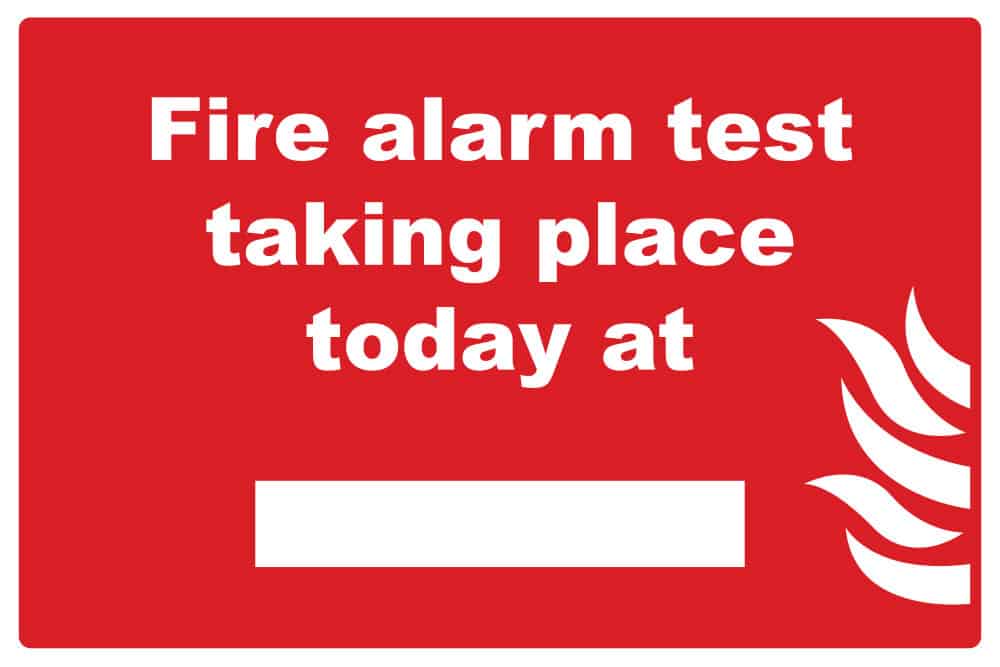
Fires in the workplace are more common than you may think. In the UK, there were 11,916 instances of fire reported during the 2020/2021 period, according to government figures.
Early detection of a fire is critical for saving lives and protecting property. Fire alarms are a crucial first line of defence against fire in the workplace. But, like any health and safety equipment, they must be properly maintained and tested to ensure they are in working order.
Just how often should a fire alarm be tested? If you’re the designated Responsible Person, you need to know. This article outlines the legal requirements for fire alarm testing in the workplace. We’ll explain when to test fire alarms and where you can find further fire safety training.
Importance of Fire Alarms in the Workplace
Modern fire alarms are incredibly effective as an early warning system and can alert workers to the presence of fire before it gets out of control. Being able to respond quickly when a fire breaks out is vital to save lives and protect property.
The majority of fatalities that occur during a fire are due to smoke inhalation rather than burns. By the time flames are visible, smoke may have already caused people to lose consciousness. In most cases, a fire alarm will detect the presence of smoke long before anyone notices that there is a fire in a building.
Does My Workplace Require Fire Alarms?
It’s a legal requirement for every workplace to have fire alarms installed. This is stipulated in the Regulatory Reform (Fire Safety) Order 2005. Under this legislation, a ‘responsible person’ is obligated to ensure that appropriate fire detectors and fire alarms are installed, wherever necessary, in the workplace.
Currently, there is a minimum penalty of £5,000 for not having fire alarms installed in your place of business. For serious breaches of the Regulatory Reform (Fire Safety) Order 2005, there is no monetary limit on penalties. In the most severe cases, criminal charges may result in a prison sentence.
Who is Responsible for Testing Fire Alarm Systems at Work?
The Fire Safety Order 2005 mandates that the test should be carried out by a competent person (Electrician or fire alarm engineer) to make sure that all fire alarms in the workplace are maintained and functioning effectively.
The Health and Safety Executive (HSE) defines the responsible person – also known as a competent person – as someone who has been trained in fire safety measures and has sufficient knowledge and experience to perform their duties.
What Are the Different Types of Fire Alarm Systems?
There are three main types of fire alarm systems found in businesses and private homes throughout the UK. These are:
- Conventional fire alarm systems – low-cost, simple systems usually used in smaller premises with low fire risk
- Addressable fire alarm systems – more complex systems used in larger buildings such as offices, schools or hospitals
- Wireless fire alarm systems – systems that are used in structures where cabling is not practical, such as historic buildings
How Often Should a Fire Alarm Be Tested?
The frequency in which the responsible person should test fire alarms is outlined under the Regulatory Reform (Fire Safety) Order 2005 and further clarified in the British Standard BS 5839. The standard states that fire alarms should be tested on a weekly basis to ensure that there are no critical failures and that the alarm is working properly.

Weekly Fire Alarm Tests
Weekly testing of fire alarms should only be done by the responsible person or by an authorised third party, such as an alarm company representative.
To do your weekly fire alarm tests correctly, you must:
- Notify all employees that a fire alarm test is being conducted
- Test your fire alarms at the same time and day so that co-workers know when to expect the test
- Test your fire alarms during normal working hours
- Notify the local emergency services before conducting a fire alarm test, to avoid them being called out for a false alarm
When testing fire alarms, it’s recommended that:
- At least one manual fire alarm call point is activated
- The alarm sounds and the panel has received the signal
- A different call point be tested each week to ensure the system’s wiring is functioning
Should Fire Alarm Tests Be Recorded?
Once the test has been completed, you should record all findings in a logbook. The logbook must show:
- Date and time of the test
- Duration of the test
- Details of any faults that have been found
- Any action that was taken to repair the faults
A fire alarm testing logbook should also have a record of dates, times and reasons for the following:
- Instances where the alarm was disconnected
- Changes made to the system
- Any time the fire alarm is triggered, whether this is because of an actual fire emergency or as part of a fire drill
Representatives from your insurance company, an HSE enforcement officer or a member of the emergency services can request to see your fire alarm testing logbook at any time.
There can be severe penalties imposed if a determination is made that your fire alarm logbook has been incorrectly compiled.
Fire Alarm Inspections
As well as weekly fire alarm tests, British Standard BS 5839 also requires that fire alarms be inspected at least once every six months.
During an inspection, the responsible person should ensure:
- Fire alarms are in good condition
- All standby batteries are working.
- The sound of the fire alarm is verified
- The fire alarms are able to link to the alarm centre
Fire alarms should be tested and inspected by someone who meets the HSE’s definition of a responsible person. This means that they should have the appropriate knowledge of fire alarm systems and be aware of the relevant health and safety legislation.
Do You Need to be Trained to Test Fire Alarms?
The Fire Safety Courses offered by Human Focus are an ideal way to gain the knowledge to ensure that all fire safety measures in your workplace are compliant with UK law. The Human Focus Fire Safety Courses can be taken online at your convenience. These courses cover topics such as general fire safety in the workplace, fire safety risk assessments and the duties of a fire safety warden.
Successful participants are awarded a certificate that can be downloaded immediately at the end of the completed and passed course. All courses are recognised and assured by authoritative health and safety bodies such as the International Institute of Risk & Safety Management (IIRSM).






















































































































































































































































































































































































































































































































































